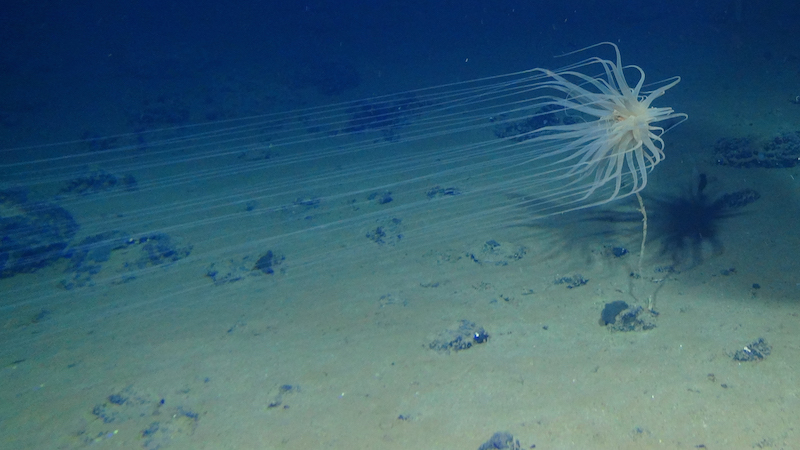As crunch talks about the future of deep-sea mining enter the final stretch, governments have not yet been able to agree on the agenda for the meeting at the International Seabed Authority (ISA) in Kingston, Jamaica.
The stalemate is dragging on as attempts to formally discuss a precautionary suspension of mining activities have been thwarted by nations in favour of exploiting the ocean’s mineral resources.
Over a dozen countries spearheaded by Chile, Costa Rica and France want to officially debate for the first time in history the possibility to halt deep-sea mining until its full impact on the ocean’s biodiversity is understood.
Hervè Berville, the French Minister for Marine Affairs, told the Assembly on Wednesday that the world “must not and cannot embark on a new industrial activity without measuring the consequences and taking the risk of irreversible damage”.
For the past decade, the mining industry has proposed to extract minerals from the deep seabed that can later be used to make batteries for electric vehicles.
However, the potential impacts of mining the ocean floor are largely unknown, putting biodiversity at risk. More than 750 marine scientists signed an open letter calling for a ban on the practice until robust scientific evidence can back it up.
High Seas Treaty exempts deep-sea mining from stricter environmental rules
Mining industry pushback
China and the island-state of Nauru have so far blocked the motion for a moratorium discussion, preventing agreement over the agenda. Both countries sponsor companies pushing for the exploitation of seabed minerals. Mexico also initially opposed but then retracted.
Gina Guillén, head of the Costa Rican delegation and one of the leaders of the coalition calling for a pause on mining, said one sole country was fiercely blocking the agenda item, even after offering a lighter discussion than expected.
“Just one country is opposing (the agenda item on the discussion). We hope it does happen. One country can’t hijack the most important body of the (ISA) just for being a big economy. That goes against all principles of multilateralism,” Guillén said.
‘We are not ready’: Divisions deepen over rush to finalise deep sea mining rules
Calls for a so-called moratorium have been gathering pace during the annual meeting of the ISA, the little-known UN body tasked with regulating the vast ocean floor in international waters.
This year’s week-long summit, set to end on Friday, comes at a pivotal time. Any member state could theoretically apply for a full-blown mining contract on behalf of a company, after a deadline triggered by Nauru lapsed earlier in July.
So far the ISA has only handed out ‘exploration’ permits which do not allow commercial exploitation of the minerals.
Mining code delayed
But several operators have already been exploring an area of the Pacific Ocean floor known as the Clarion Clipperton Zone. The region is rich in polymetallic nodules containing nickel, cobalt, copper and manganese, which are critical for manufacturing electric vehicles.
Among the most active is Canada-based start-up The Metals Company, whose license is sponsored by Nauru. After the island nation triggered an obscure provision two years ago, the ISA accelerated the pace of its negotiations to establish mining rules before a July 9th, 2023.
The Metals Company, and its partner Nauru, hoped to begin industrial-scale mining as early as 2024, following the expected approval of a mining code.
But their ambitions were cut back last week after the ISA delayed timeline for the regulations. The 36 members of the body’s council gave until 2025 to adopt the mining code.
It is now a question of when — rather than if — commercial scale nodule collection will begin. https://t.co/oWI8AOZPBR
— gerard barron (@gtbgtb) July 24, 2023
Blow to industry
Nauru’s president Russ Joseph Kun expressed disappointment on Wednesday that the ISA did not complete the process within the two-year deadline.
Member states in fact could still apply for a mining licence despite the rules not being in place. This would push the body into uncharted territory without clear guidelines on how such a request would be examined.
The Metals Company said it reserves the right to submit an application in the absence of a mining code. “It is now a question of when — rather than if — commercial-scale nodule collection will begin”, its CEO Gerard Barron said in a statement.
But the listed company’s stock tumbled by over 20% this week, hinting at investors’ diminishing confidence in its mining prospects.
Guillén from Costa Rica said approving the new 2025 deadline was “critical”. “They wanted a 2024 deadline, but we said no way,” she said.
Moratorium discussion
Campaigners opposed to deep-sea mining viewed the new 2025 deadline for the mining code with optimism but repeated their pleas for a moratorium, which would block any attempt to start commercial operations.
“This unprecedented agenda fight comes as a coalition of nations from Latin America, the Pacific and Europe try and wrangle the debate away from serving narrow corporate interests towards the public good”, said Louisa Casson from Greenpeace, who is attending the talks in Jamaica.
If the agenda is approved, it would mark the first time countries hold a formal discussion on suspending deep sea mining, although this discussion would not necessarily lead to a moratorium.
Still, Gillén said this is an important precedent, and said “we cannot destroy the seabed by taking a rushed decision”.
Last year, countries agreed to a treaty for the high seas, which creates international marine protected areas. However, this milestone could be undermined if deep sea talks end up with a bad deal, the Costa Rican negotiator added.
“Even after having agreed to the (high seas) treaty, if we don’t have strong safeguards for the seabed in those same areas, then we won’t have achieved anything,” Guillén said.

